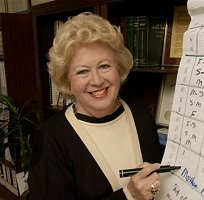Memphis Rule 31 Approved Family Law Mediation Training
Ms Wurzburg is partnering with Professor Steve Shields, Esq, to train participants in Rule 31 approved Family and General Civil disputes
Next FAMILY training 8 am to 6 pm:
February 27, 28, and continuing
March 2, 3, & 4, 2020, for 40/46 hours ($1400 / $1550)
or CROSSOVER 24/30 hour ($1000 / $1150) is March 2, 3, & 4.
Saturday, February 29, is the 6 hour family law review non family law attorneys will need for the Crossover or 40 hour basic training, 9:00 am to 4:00 pm
Call 901-684-1332 or write wurzburg@mediate.com for information
February 27, 28 class location to be announced
February 29 and March 2, 3, & 4 Classes held at 5159 Wheelis Drive in Memphis, Tennessee.
Next Training for 40 hour GENERAL CIVIL mediation ( $1250) 8:00 am to 6:00 pm:
February 27 & 28 and continuing
March 5, 6, & 7
Location to be announced
Ms. Wurzburg teaches Rule 31 approved family law and divorce mediation in the facilitative style* of mediation. In other words, she shows you how to mediate parenting issues, spousal support and division of assets and debts with the couple in the same room. The parties work out these decisions together and Ms Wurzburg will teach you how to get them to do this.
She teaches the 40 hour basic course: theories of mediation, techniques, demonstrations, role playing of the various issues. If you are not a practicing family law attorney, she teaches an additional 6 hours of Tennessee family law.
The Tennessee Supreme Court issued Rule 31 which allows judges to order parties to try mediation or other forms of Alternate Dispute Resolution. When it did that, it needed a list of mediators to give the judges. And it needed a list of mediation trainers. To get listed with the Supreme Court, you have to have been trained by an approved trainer. Ms Wurzburg is a Rule 31 approved mediation trainer. For other qualifications for being listed (and be aware you don't have to be listed to be a mediator) see the Tennessee Supreme Court web site.
If you have been trained to mediate disputes other than divorce, you may take her 24 or 30 hour "crossover family law training" course.
The cost of the courses:
46 FAMILY hours -- $1550
40 FAMILY hours -- 1400
30 FAMILY CROSSOVER hours -- 1150
24 FAMILY CROSSOVER hours -- 1000
6 hour Family Law Review only -- $300
GENERAL CIVIL 40 hour -- 1250
16 hour CROSSOVER from family to general civil -- 750
Call Ms Wurzburg at 901-684-1332 for more information
I prefer the facilitative method, facilitating negotiations between the parties face to face rather than exclusively shuttling back and forth between separated parties. Clients report they feel more involved in the decision-making process, each having had a chance to be heard. Facilitative mediation hastens trust of the mediator; there is less wondering and worrying what’s being said in the other room.
* In facilitative mediation, each client gets to tell his or her story to the other. Options for possible resolution get listed (I use a flip since I don’t know if the person sitting in front of me is a right brain or left brain learner), discussed, and chosen. And yes, this process allows each disputant to observe just how each may be perceived by a judge or jury. Facilitative mediators may meet in private sessions with each side to go through a specific process that helps the attorney chart and evaluate the case for the client.
Transformative mediation, which uses the facilitative method, is more concerned with the process of conflict resolution than the resolution itself. This is often contrasted with evaluative mediation that is so "resolution focused" you may see the mediator evaluating the case for each side and then telling them how they ought to settle. There is a form of ADR called Early Neutral Evaluation that does just that. Employing empowerment and recognition as techniques, transformative mediation hopes to transform the clients from angry, self- centered, win/lose positioned disputants to cooperative, acknowledging, now and future focused, responsible ones. And maybe even get to resolution. It allows a lot of leeway for the clients to frame the issues and the discussion. Transformative mediators use the facilitative style. Thus, should the clients not resolve all issues in that mediation session, the likelihood of them being able to do so before resorting to litigation is high. According to Professor Robert Baruch Bush of Hosta University and his co-author Joseph Folger in their book, The Promise of Mediation , the mediation process should promise something more to the client than just closing the file.
Perhaps my style is best described by Professor/attorney/mediator David Hoffman in his article "Confessions of a Problem-Solving Mediator" in the 1999 Volume 23 Number 3 newsletter of the Society of Professional in Dispute Resolution. He contrasted transformative mediation with problem solving and suggested we experienced mediators intuitively engage techniques that fall somewhere in between.
Again, the trick and talent of the experienced mediator is to know what style to use -- and when.
Certification of mediation specialist is not currently available in Tennessee. Approved by the Tennessee Supreme Court’s Alternate Dispute Commission under its Rule 31 for civil law and family law cases.

